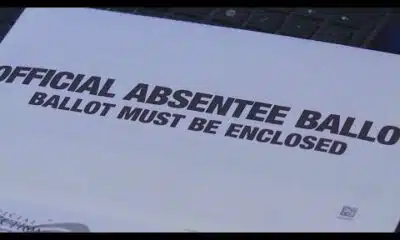Mississippi News
NAACP questions constitutionality of redistricting plan
Mississippi NAACP questions constitutionality of redistricting plan
The state chapter of the NAACP is asking a three-judge federal panel to rule on whether the U.S. House redistricting plan recently approved by the Legislature and signed into law by Gov. Tate Reeves is constitutional.
The judicial panel will hear further arguments on the issue before ruling.
Carroll Rhodes, a Hazlehurst attorney and veteran of many redistricting litigation battles, maintains that the plan approved by the Legislature with a Black majority 2nd District that runs nearly the length of the state along the Mississippi River is not constitutional. He maintains the sprawling district will make it more difficult to elect an African American when Bennie Thompson, the state’s sole Black U.S. House member and the 2nd District incumbent, opts not to seek re-election.
Rhodes made his argument Wednesday in front a three-judge federal panel that has had jurisdiction of the state’s congressional redistricting process since the early 2000s when the Legislature could not agree on a plan. The Legislature also could not agree on a plan 10 years later to redraw the districts to adhere to population shifts ascertained by the 2010 U.S. Census.
This year the Legislature did pass a plan, and during Wednesday’s status conference in Jackson the panel of judges appeared ready to end its oversight of Mississippi’s congressional redistricting.
But Michael Wallace, a Jackson attorney representing the Republican Party, agreed with Rhodes that the three-judge panel should maintain jurisdiction long enough to hear the complaints of Rhodes and the NAACP. He said the panel could end its involvement, but it would not prevent Rhodes from filing a new lawsuit, necessitating the convening of a new three-judge panel comprised of members who would not have the background on the issue that the current judges have.
“It would be prudent for you to finish what you started,” Wallace told the panel, though he stressed he believes the plan approved by the Republican majority Legislature is constitutional.
Rhodes agreed that the panel should maintain jurisdiction. He argued that the panel should hold a hearing and allow depositions and other fact-finding.
He said there are questions about whether “the intent” of the Legislature with the plan it passed was to prevent African Americans from winning future congressional seats.
Rhodes argued that the Legislature violated one of the primary principles put forth by the panel of ensuring the compactness of the districts. He suggested that the judges could “tweak” the plan it adopted in 2011 to adhere to population shifts found by the Census while it heard the arguments of the NAACP.
Rhodes added the NAACP had proposed a plan that made those tweaks by adding all of Hinds County and a small portion of southern Madison County, a Jackson suburb, to the majority Black 2nd District. The plan approved by the Legislature instead added four counties in southwest Mississippi to the 2nd District, meaning the district encompasses almost the length of the state on the western border.
“The question becomes whether a Black candidate can raise the funds to campaign in a district that runs the length of the state,” Rhodes said.
The 2nd District was the only one of the state’s four congressional districts to lose population — about 65,000 people, according to the 2020 Census.
Appeals Court Judge E. Grady Jolly, a member of the three-judge panel, seemed skeptical of the claim that an African American candidate might not prevail in a district that has a Black population of more than 60% like the 2nd in the plan approved by the Legislature.
Rhodes indicated that Black voters in the four counties in southwest Mississippi added to the district might not turn out at the same level as those in some other parts of the state.
Wallace told the panel that it should allow the legislative plan to go into effect while hearing Rhodes’ arguments.
Both sides will present additional written arguments to the panel during February. The judges will have to make some type of ruling quickly since the qualifying deadline for candidates to run for Congress is March 1.
READ MORE: Lawmakers redraw congressional districts for first time since early 1990s
This article first appeared on Mississippi Today and is republished here under a Creative Commons license.
Mississippi News
Suspect in Charlie Kirk killing is charged with murder as prosecutor says DNA found on rifle trigger
SUMMARY: Tyler Robinson, 22, was charged with the murder of conservative figure Charlie Kirk, shot Sept. 10 at Utah Valley University. Robinson confessed via text to his partner and left a note expressing intent to kill Kirk, citing hatred. DNA linked Robinson to the rifle used. Prosecutors revealed Robinson planned the attack for over a week and targeted Kirk, a key conservative youth leader. Robinson’s political views shifted after dating a transgender man, causing family tensions. After the shooting, Robinson discarded evidence and urged his partner to delete texts. FBI investigates possible wider connections. Charges include murder with potential death penalty enhancements.
Read the full article
The post Suspect in Charlie Kirk killing is charged with murder as prosecutor says DNA found on rifle trigger appeared first on www.wjtv.com
Mississippi News
Suspect in Charlie Kirk assassination believed to have acted alone, says Utah governor
SUMMARY: Tyler Robinson, 22, was arrested for the targeted assassination of conservative activist Charlie Kirk in Orem, Utah. Authorities said Robinson had expressed opposition to Kirk’s views and indicated responsibility after the shooting. The attack occurred during a Turning Point USA event at Utah Valley University, where Kirk was shot once from a rooftop and later died in hospital. Engravings on bullets and chat messages helped link Robinson to the crime, which was captured on grim video. The killing sparked bipartisan condemnation amid rising political violence. President Trump announced Robinson’s arrest and plans to award Kirk the Presidential Medal of Freedom.
The post Suspect in Charlie Kirk assassination believed to have acted alone, says Utah governor appeared first on www.wjtv.com
Mississippi News
Americans mark the 24th anniversary of the 9/11 attacks with emotional ceremonies
SUMMARY: On the 24th anniversary of the 9/11 attacks, solemn ceremonies were held in New York, at the Pentagon, and in Shanksville to honor nearly 3,000 victims. Families shared personal remembrances, emphasizing ongoing grief and the importance of remembrance. Vice President JD Vance postponed his attendance to visit a recently assassinated activist’s family, adding tension to the day. President Trump spoke at the Pentagon, pledging never to forget and awarding the Presidential Medal of Freedom posthumously. The attacks’ global impact reshaped U.S. policy, leading to wars and extensive health care costs for victims. Efforts continue to finalize legal proceedings against the alleged plot mastermind.
The post Americans mark the 24th anniversary of the 9/11 attacks with emotional ceremonies appeared first on www.wcbi.com
-
News from the South - Kentucky News Feed7 days ago
Lexington man accused of carjacking, firing gun during police chase faces federal firearm charge
-
News from the South - Alabama News Feed6 days ago
Zaxby's Player of the Week: Dylan Jackson, Vigor WR
-
News from the South - Arkansas News Feed7 days ago
Arkansas medical marijuana sales on pace for record year
-
Local News Video7 days ago
William Carey University holds 'tailgates and tourniquets' blood drive
-
News from the South - North Carolina News Feed5 days ago
What we know about Charlie Kirk shooting suspect, how he was caught
-
News from the South - Missouri News Feed7 days ago
Local, statewide officials react to Charlie Kirk death after shooting in Utah
-
Local News6 days ago
US stocks inch to more records as inflation slows and Oracle soars
-
Local News6 days ago
Russian drone incursion in Poland prompts NATO leaders to take stock of bigger threats


















































